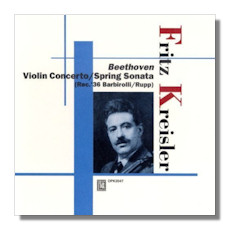
The Internet's Premier Classical Music Source
Related Links
- Beethoven Reviews
- Latest Reviews
- More Reviews
-
By Composer
-
Collections
DVD & Blu-ray
Books
Concert Reviews
Articles/Interviews
Software
Audio
Search Amazon
Recommended Links
Site News
 CD Review
CD Review
Ludwig van Beethoven

- Violin Concerto in D Major, Op. 61
- Violin Sonata #5 in F Major "Spring", Op. 24 *
Fritz Kreisler, violin
* Franz Rupp, piano
London Philharmonic Orchestra/John Barbirolli
Opus Kura OPK2047 Monaural
There are so many historical labels around that I don't really blame most collectors for ignoring these recordings and buying new issues. Worse, most historical buffs also tend to be audiophiles, comparing and contrasting dozens of Toscanini, Heifetz, and Caruso reissues until not even they know what's what. So far, I have been very impressed with Opus Kura, a Japanese label that has a well-earned reputation for excellent sound restoration. The label's catalog is available through Albany Music Distribution, and is well worth investigating.
Had he recorded in stereo, I have no doubt that Fritz Kreisler would have a more popular following. He is the violinist's violinist, possessing a full, rich tone that is nothing short of astonishing even today. These 1936 recordings leave no doubt that he was one of the greats. He also had the advantage of first-rate orchestral partners in an era where those were generally seen as less important. John Barbirolli was an excellent conductor, and he gets the London Philharmonic to provide a steady and propulsive framework for the Beethoven Concerto. As for Kreisler, he's just as musical as ever, though the general consensus is that his reading from a decade earlier is more technically assured. I'm tempted to agree with this assessment, even if in the latter the London Philharmonic is far more interesting than the Berlin State Opera Orchestra under Leo Blech. And make no mistake; Kreisler's golden tone is still very much intact, along with his somewhat idiosyncratic slides. The present transfer is noisy, but certainly allows the violin tone to bloom, which is frankly all I care about in this case.
Well, almost. The Larghettos are both magnificently sung out, but Barbirolli phrases whereas Blech lurches. It's very noticeable. Neither orchestra is going to win awards. I prefer the later recordings' Rondo as well, as I find the improved sonic technology allows us to hear assertive power that Kreisler could unleash to greater effect. All in all, small factors tip the scale in this present recordings' favor, and the sound here is perfectly acceptable for me, though some will doubtless traverse the globe to see if there is better.
In the Sonata, I'm thrilled by Kreisler's gorgeously effortless melodies, while conceding that his tone is a touch shakier than it was in the decades before. Franz Rupp, by no means a superstar pianist, is captured faithfully enough and plays very well. They worked together often; this is from the complete set of ten, and I'm very happy with the results. I'm also happy with the sound quality, which is crackly and noisy but also allows the instruments to bloom by not taming the noise to silence. In short, this is a very important disc.
Copyright © 2014, Brian Wigman



















